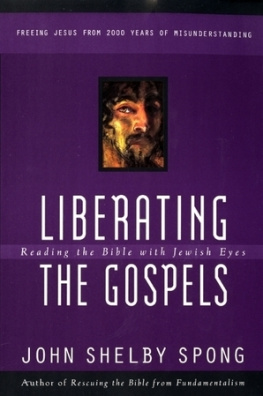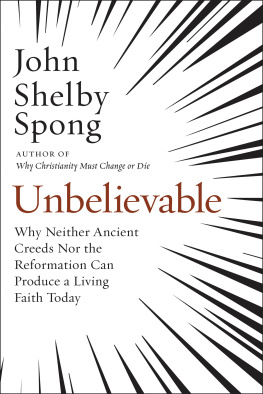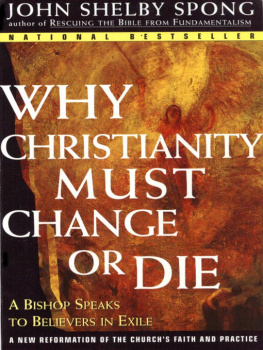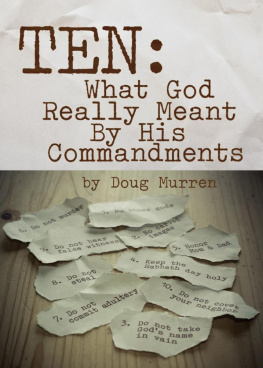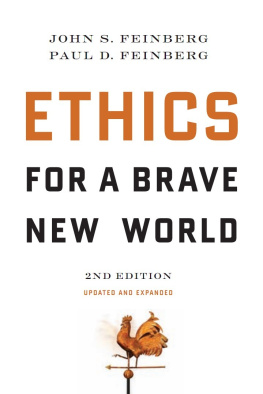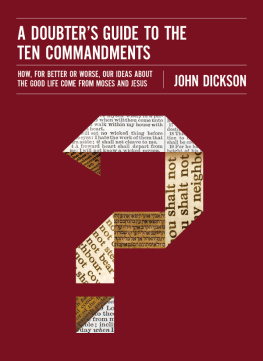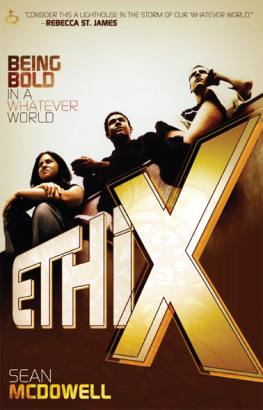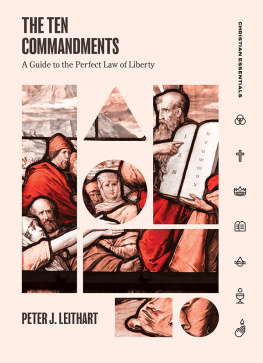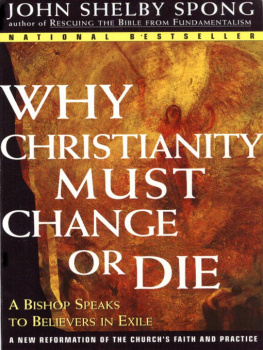BEYOND MORALISM
A Contemporary View
of the Ten Commandments
John Shelby Spong
Denise G. Haines

To my parents
Doolie Griffith Spong (1907-) and
John Shelby Spong (1889-1943)
Who taught me my first lessons in life and who provided me with the capacity to love, the security to live, and the courage to be.
J.S.S.
To my parents
Elizabeth Van Kannel Richman Games (1911-1967) and
Denbeigh Warren Games (1909-1967)
From whom I continue to draw love and courage through memory.
D.G.H.
The Ten Commandments
And God spoke all these words, saying,
I am the L ord your God, who brought you out of the land of Egypt, out of the house of bondage.
You shall have no other gods before me.
You shall not make for yourself a graven image, or any likeness of anything that is in heaven above, or that is in the earth beneath, or that is in the water under the earth; you shall not bow down to them or serve them; for I the L ord your God am a jealous God, visiting the iniquity of the fathers upon the children to the third and the fourth generation of those who hate me, but showing steadfast love to thousands of those who love me and keep my commandments.
You shall not take the name of the L ord your God in vain; for the L ord will not hold him guiltless who takes his name in vain.
Remember the sabbath day, to keep it holy. Six days you shall labor, and do all your work; but the seventh day is a sabbath to the L ord your God; in it you shall not do any work, you, or your son, or your daughter, your manservant, or your maidservant, or your cattle, or the sojourner who is within your gates; for in six days the L ord made heaven and earth, the sea, and all that is in them, and rested the seventh day; therefore the L ord blessed the sabbath day and hallowed it.
Honor your father and your mother, that your days may be long in the land which the L ord your God gives you.
You shall not kill.
You shall not commit adultery.
You shall not steal.
You shall not bear false witness against your neighbor.
You shall not covet your neighbors house; you shall not covet your neighbors wife, or his manservant, or his maidservant, or his ox, or his ass, or anything that is your neighbors.
Exodus 20:1-17
CONTENTS
T his book is a new venture in writing for both of its authors. It is based upon an earlier book, The Living Commandments, that was published in 1977 as the work of a single author. The preparation, the study, and the perspective on life that generated its content was shaped by the experience of that man. He was an Episcopal priest who was elected to the office of bishop in the middle of the books gestation. He was a child of the South and far more provincial than even he imagined. The original volume reflected a limited worldview, a relatively stable and static environment, and a strikingly male and moralistic prejudice. Nevertheless, within those bounds it was received as a fresh, liberal, and controversial treatment of some of the major ethical issues of the day. In spite of its limitations, the book circulated well and only in 1984 went out of print.
In the nine years since that books publication the world has changed, and so has its original author. Living now in the eclectic marketplace of the metropolitan New York area, embracing the pluralism of an expanding consciousness in a rapidly shrinking world, and being confronted by old values that are dying and new values that are emerging, he has come to some new perspectives on Christian ethics for this contemporary era.
In the past decade, rapid change has affected public and private attitudes and lifestyles. Family patterns have continued to shift with the rising divorce rate and the delay in childbearing among young professionals. More than forty percent of the households in America are now single-parent or single-person households. Lengthened expectancy has put unexpected pressures on institutions that are unprepared for such tenured relationships: marriage, pension funds, Social Security, and medical facilities. Homosexuals have continued to come out of the closets into which the fears of the majority had assigned them. New strains of sexually transmitted diseases have brought heightened anxieties. National boundaries, which are important in helping people define themselves and establish their values, have become increasingly porous as oppressed people migrate in search of a better life. In most of the countries of the modern world, legalized abortion is more widely practiced than many had anticipated. In advanced societies new technology has created life-support systems that in turn have forced new legal definitions of clinical death and have raised new issues of biomedical ethics. Population explosions and environmental crises have presented us with pictures of starving populations. The roles of women continue to expand. This is symbolized in this country by a woman judge on the Supreme Court and a woman candidate for Vice President of the United States. Many observers believe the Episcopal Church will elect its first woman bishop by 1990. Religious institutions have shifted slowly but surely to the right and have hardened their positions on many issues, such as opposition to birth control, adherence to strict orthodoxy, and defense of various claims of infallibility in some form. The movement of the religious right has captured the attention of the media and has masked the ever-widening erosion of religious power and religious influence.
Obviously, a book that sought to address the ethical issues of our day from the perspective of the Judeo-Christian faith community would need to be revised, changed, and updated in such a world. Indeed, something close to a new book had to be envisioned.
But can a person who wrote a work years ago escape the bondage of his previous words to say anything new enough, fresh enough, or challenging enough to warrant another effort to address the same concerns in print? When the publisher suggested that possibility to the author, he made no immediate response.
Yes, the author had changed. He had published two volumes since The Living Commandments had first seen the light of day. He had grown older by almost a decade. He had adjusted to many moments of trauma, both personal and professional, that had brought a measure of patience and bent him if ever so slightly under the weight of age. But had he changed enough, or did he know enough, to undertake such a task?
At that point the authors life crossed the co-authors life in a significant way. The co-author was one of the early women priests of the Episcopal Church. The author, as her bishop, had ordained her to the priesthood in 1977. He had admired her abilities and her writing skills. In early adulthood she had been a musician. A career as wife and mother followed. At the midpoint of her life she had entered the General Theological Seminary in New York City with no conscious intention to be ordained, but simply, as she said, to satisfy a theological appetite that had been growing for some time. It was for her a life-changing decision. At some point in that process she crossed the Rubicon. She received her Master of Divinity degree in the spring of 1977, just about the time The Living Commandments made its appearance in the bookstores. She was ordained deacon and priest that year. Continuing her education, she was fully certified in 1981 by the American Association for Clinical Pastoral Education as a hospital chaplain supervisor trained to educate clergy in pastoral ministry. While in that process, she was called in 1979 to be priest in charge of a 600- member churchan unusual, perhaps unique, experience for a woman at that time. Her tenure at that church lasted for four years.


